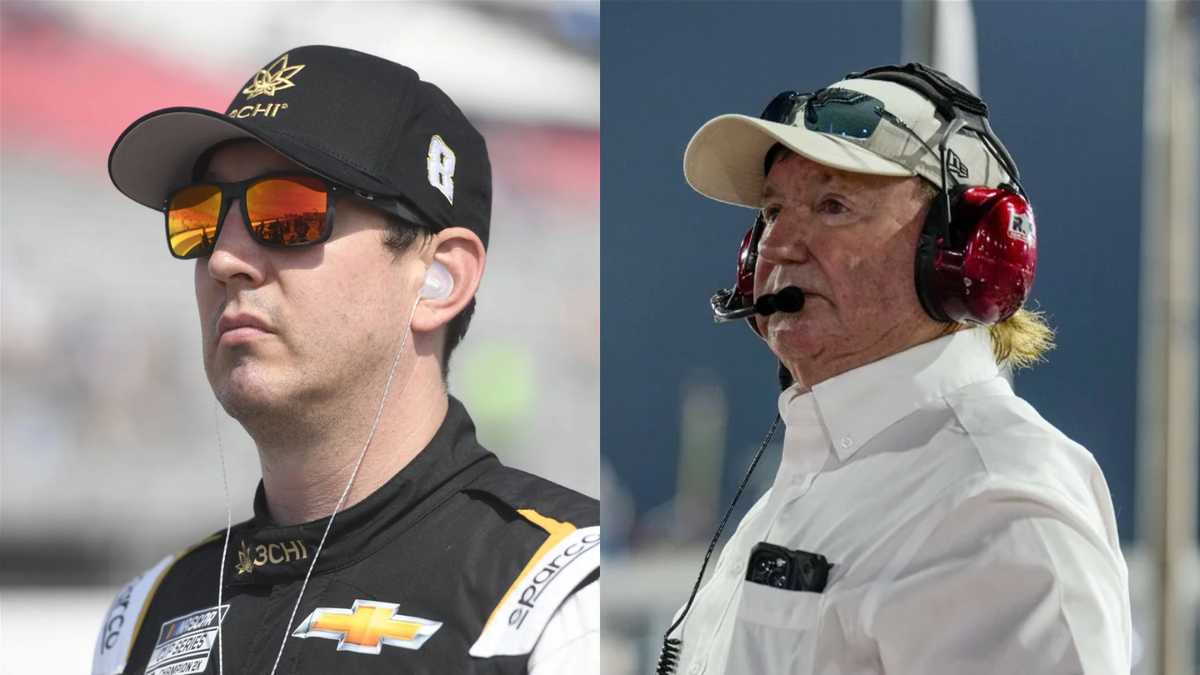
Imago
Kyle Busch and Richard Childress | Credits – Imago

Imago
Kyle Busch and Richard Childress | Credits – Imago
“Gotta get some racecars. We are in trouble. Period.” Late in the 2025 season, tensions at Richard Childress Racing have been hard to miss. After a sharp radio moment where team owner Richard Childress expressed stark frustration with performance, eyes quickly turned to Kyle Busch and the No. 8 Chevrolet he pilots. Busch, a driver known for his relentless competitiveness, has endured a season marked more by struggles than victories. Despite some solid finishes, the No. 8 car has never truly found the edge on the track this year.
Watch What’s Trending Now!
Behind the scenes, the team faces mounting pressure to turn things around amid a shifting NASCAR landscape. With more than half the season complete, the questions remain: What is the problem? How bad are the struggles? What is Busch’s perspective on the efforts and challenges RCR is facing?
Kyle Busch lays bare RCR’s main issue amid hard work and potential
Kyle Busch recently spoke openly on the Pat McAfee Show about the ongoing challenges facing him and Richard Childress Racing. Busch underscored that the woes stem not from a lack of work ethic or team effort. “It is not due to lack of effort, that’s for damn sure, you know… everybody at RCR… back there at the race shop… they’re working as hard as they can,” he said, praising the determination of the RCR crew and engineers tirelessly analyzing data and adjusting setups. However, he feels the problems are due to a stark speed deficit against competitors. Despite the team efforts, the car just hasn’t matched the velocity needed to compete at the front consistently.
Statistically, Busch’s 2025 season reflects these challenges. Through 21 races, he has posted 14 top-20 finishes, seven top-10s, and two top-five finishes, placing him around 15th in series standings with an average finish of about 16.952. This represents a notable dip compared to earlier years but signals some incremental improvement over 2024, which saw Busch’s worst average finish since his rookie season. His teammate, Austin Dillon, is also struggling to climb the points, hovering near 28th, with only sporadic top-10s and a controversial win that didn’t convert into playoff eligibility.
Busch explained on the Pat McAfee Show, “Balance of the race cars has been pretty good this year. You know… like the driveability feels okay. It’s just the lack of speed.” The missing ingredient is outright speed compared to the fleet. “There’s just guys out there…they have more potential. You know, they’re just faster,” he said. His outlook is cautiously optimistic, though, especially at road courses like Indianapolis Motor Speedway, where he’s historically performed well. “I love Indy… coming to Indy is a lot of fun. I’ve really gotten pretty good here over the years…..I feel pretty good about me here at Indy” Busch said, reflecting his love for Indy, and on a near-win at Indy last year, Busch believes RCR can still contend as the team works to close the gap, laying a foundation for future success.
This frank admission from Busch aligns with internal voices at RCR who acknowledge that while the team’s overall speed has improved in 2025, they must learn how to convert that into victories. “There’s a difference between running fifth and winning,” said RCR’s VP of Competition, Keith Rodden. The focus is clear: boost qualifying speed, race pace, and capitalize on opportunities to secure wins and playoff positioning.
Kyle Busch on modern NASCAR drivers and the evolving culture of the sport
Beyond the struggles with the performance of his equipment, Kyle Busch has spoken more broadly about the shifting culture within NASCAR and how drivers today navigate this modern era differently than in the past. Busch acknowledges that the sport has evolved dramatically, with younger drivers bringing new mindsets both on and off the track.
Kyle Busch highlighted a fundamental transformation in NASCAR’s technical landscape over the past few years, which has had a direct impact on the role of driver skill. Busch explained, “The last three years have become more sourced from a single source supplier,” meaning teams no longer build their chassis or bodies as they used to; instead, “everybody buys their chassis from the same place. The bodies all come from the same place. The parts and pieces all come from the same place.”
He notes that today’s NASCAR drivers are engaged in a highly competitive, media-savvy environment where drivers must juggle racing performance with brand building and fan interaction in a way previous generations did not. Busch respects the adaptability required but has also expressed the value of maintaining certain traditional competitive fire and focus amid these changes.
Amid the 2024 Cup Series playoffs, Alex Bowman also spoke about how the Next-Gen car has changed the way people race. “Yeah, it’s gotten crazy over the last couple of years, for sure. It’s changed a lot. It’s changed for everybody, and I feel like I’m not the overly aggressive, dirty race car driver, and the races have played out to really benefit the overly aggressive, dirty race car driver,” Bowman said.
Busch emphasizes the importance of maintaining core grit and determination in racing, despite the rise of advanced technology and analytics. He believes that while NASCAR evolves, drivers must balance modern demands with the sport’s fundamental speed, skill, and strategy. Kyle Busch’s recent insights highlight a team grappling with a speed deficit despite their efforts, while he navigates NASCAR’s evolving competitive and cultural landscape. His role as a driver connects the sport’s traditions with its future. How Busch and RCR address on-track performance and off-track dynamics will be crucial as the 2025 season unfolds.








